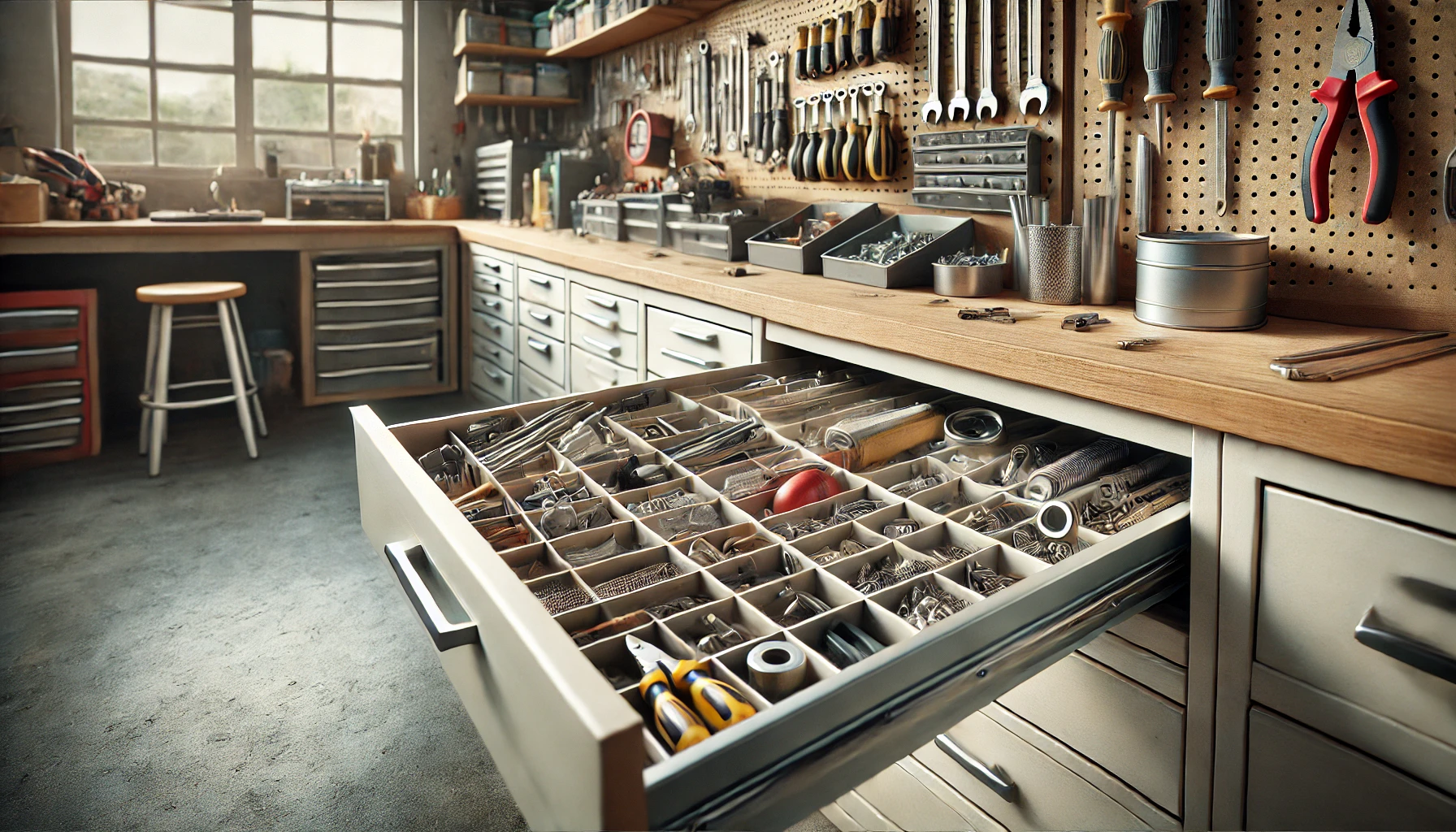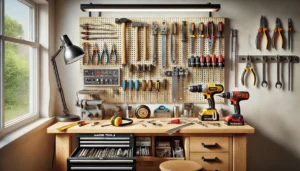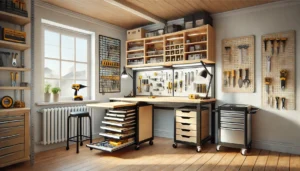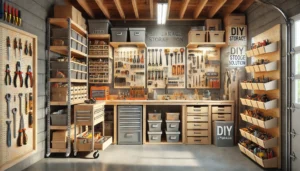
Drawer organizers are essential tools for maintaining order and efficiency in your small workshop. By keeping your tools and materials neatly arranged and easily accessible, you can save time and reduce frustration when working on projects. In this article, we’ll explore various types of drawer organizers and provide tips on how to use them effectively in your small workshop.
The Benefits of Drawer Organizers
Drawer organizers offer numerous advantages, including improved organization, increased efficiency, and a cleaner workspace.
Improved Organization:
Drawer organizers help keep your tools and materials neatly arranged, making it easier to find what you need when you need it.
By preventing items from shifting or getting mixed up, organizers can help you maintain a tidy and efficient workspace.
Increased Efficiency:
An organized drawer allows you to quickly locate tools and materials, reducing the time spent searching for items.
This can improve your overall workflow and productivity, allowing you to focus more on your projects.
Cleaner Workspace:
Drawer organizers help keep your workbench and other surfaces clear of clutter by providing designated storage for your tools and materials.
A cleaner workspace is not only more pleasant to work in but also safer and more efficient.
Types of Drawer Organizers
Tray Organizers:
Tray organizers are shallow trays with compartments of various sizes. They are ideal for storing small items like screws, nails, washers, and other hardware.
Tray organizers can be stacked or placed side by side in a drawer to maximize storage space.
Adjustable Dividers:
Adjustable dividers are versatile organizers that allow you to create custom-sized compartments within a drawer. They can be moved and reconfigured as needed to accommodate different tools and materials.
These organizers are perfect for storing larger tools like wrenches, pliers, and screwdrivers.
Insert Organizers:
Insert organizers are designed to fit into specific drawers and provide pre-defined compartments for tools and materials. They are often made of foam or plastic and can be customized to fit your needs.
Insert organizers are ideal for storing delicate or precision tools that need to be kept in place.
Modular Organizers:
Modular organizers consist of individual compartments that can be arranged and rearranged to create a custom storage solution. They are perfect for drawers of all sizes and can be used to store a variety of items.
These organizers are great for keeping tools and materials separated and easily accessible.
Tool-Specific Organizers:
Tool-specific organizers are designed to hold specific types of tools, such as socket sets, drill bits, or chisels. They provide a designated spot for each tool, ensuring that everything is kept in order.
These organizers are ideal for drawers dedicated to specific types of tools or tasks.
Implementing Drawer Organizers in Your Workshop
Assess Your Needs:
Before purchasing drawer organizers, assess your needs and consider what tools and materials you need to store. Make a list of the items you use most frequently and the types of organizers that would best suit your needs.
Measure Your Drawers:
Measure the dimensions of your drawers to ensure that the organizers you choose will fit properly. Consider the height, width, and depth of the drawers, as well as the available space for stacking or arranging organizers.
Choose the Right Organizers:
Choose organizers that are suited to the types of tools and materials you need to store. For example, use tray organizers for small items like screws and nails, and adjustable dividers for larger tools like wrenches and pliers.
Arrange Organizers Efficiently:
Arrange your organizers in a way that maximizes space and keeps frequently used items within easy reach. Consider the layout of your drawers and how you can best utilize the available space.
Label Compartments:
Label the compartments of your organizers to make it easy to find and return items. This can save you time and reduce frustration when searching for specific tools or materials.
Tips for Maintaining Organized Drawers
Regular Cleanups:
Set aside time at the end of each work session to clean up your workspace and organize your drawers. Put tools back in their designated spots, and make sure everything is neatly arranged.
Periodic Decluttering:
Periodically go through your drawers to declutter and organize. Get rid of items you no longer need or use, and reconfigure your organizers as needed to accommodate new tools and materials.
Tool Maintenance:
Keep your tools in good working condition by performing regular maintenance. Clean, sharpen, and lubricate your tools as needed, and make sure they are properly stored in your organizers.
Adapt to Changing Needs:
Be flexible and willing to adapt your drawer organizers to meet changing needs. As your tool collection grows or your projects change, adjust your organizers to ensure they continue to meet your needs.
Personalizing Your Space
Finally, don’t forget to add personal touches to your workshop to make it a space you enjoy spending time in. This can include decorating with posters, adding a comfortable chair, or setting up a sound system for music.
Decorations:
Add motivational posters or artwork to your walls to inspire creativity. Personalize your pegboard with colors or designs that reflect your style.
Comfort:
Invest in a comfortable chair or stool for those long hours spent working on projects. Ensure your workspace is ergonomically designed to reduce strain and fatigue.
Entertainment:
Set up a small sound system or speakers to listen to music, podcasts, or audiobooks while you work. Having entertainment can make the time spent in your workshop more enjoyable and productive.
Drawer organizers are essential tools for maintaining order and efficiency in your small workshop. By choosing the right organizers and implementing them effectively, you can create a well-organized and efficient workspace that meets your needs. Regularly clean, declutter, and maintain your drawers to ensure they remain functional and organized. Embrace the challenge and enjoy the process of creating a workshop that reflects your personality and enhances your productivity.



